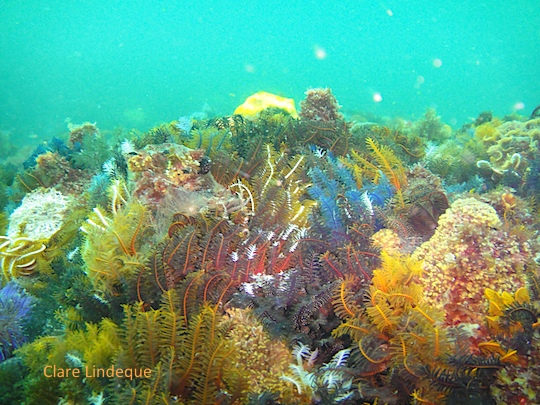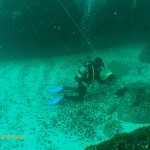I’m not sure why I haven’t written about Roman Rock before. I’ve actually done four dives on the main reef, the first in 2010. The pictures in this post are from more than one of the dives – I’ll group them together, and you’ll be able to see by the water colour which dive is which.

Roman Rock reef is a very large collection of boulders separated by sand patches, centred on the Roman Rock lighthouse. Nearby reefs include Castor Rock, Livingstone Reef, Roman’s Rest, Wonder Reef, and Tivoli Pinnacles. The reef is comprised of granite boulders, heavily encrusted with typical Cape Town reef life – feather stars, brittle stars, nudibranchs, sea stars, urchins, sea cucumbers and ascidians – varying with the depth. If the current is strong you will find a lot of fish here, mostly roman and hottentot, enjoying the tasty bounty brought by the tide.
Part of the dive is along high walls that are reminiscent of Atlantis Reef, further south. There are deep dead-end passages in between the rocks, wide enough to swim through (or drive a car through), and the rippled sand looks like a white carpet or a runway. In the middle of nowhere you will come across a ladder; it’s been there since the first time I dived Roman Rock in 2010. Your guess is as good as mine.


The site is suitable for Open Water divers, as the maximum depth one can attain while staying adjacent to the reef is about 18 metres. There are several pinnacles and shallower plateaus that are suitable for deeper safety stops. It goes without saying that each diver must have a surface marker buoy – the site is a relatively short boat ride from False Bay Yacht Club, but offshore nonetheless and there may be boat traffic, depending on where the current takes you.
Dive date: 3 August 2013
Air temperature: 22 degrees
Water temperature: 14 degrees
Maximum depth: 16.5 metres
Visibility: 10 metres
Dive duration: 38 minutes

























